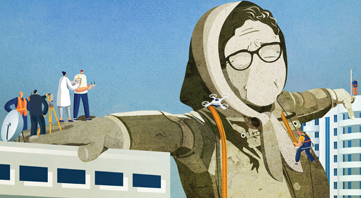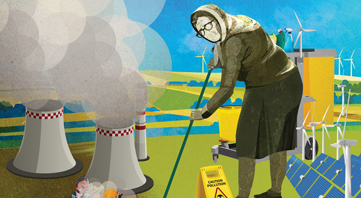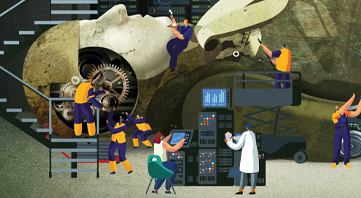Introduction
The title of this year’s Transition Report – “The State Strikes Back” – reflects both the trend towards growing acceptance of state involvement and the increased expectations that are now being placed on the state. That is to say, the title is a statement of fact, rather than a value judgement. For libertarian free marketeers, “The Empire Strikes Back” might have been a more suitable title, while for those on the left, the renewed strength of the state may be more akin to “The Return of the Jedi”. This report does not engage in such ideological “star wars”, instead using data to signal emerging trends, explain their core drivers and identify policy implications.
Foreword
The end of communism in eastern Europe in the late 1980s and the subsequent collapse of the Soviet Union seemed to be the ultimate justification for reducing the state’s role in the economy. In the decade and a half that followed, privatisation, deregulation and measures aimed at freeing enterprises and banks from state interference were the order of the day.
Since then, however, three countervailing forces have triggered calls for a stronger economic role for the state. First, it has become evident, particularly in light of the global financial crisis of 2008-09 and the economic recession that followed in its wake, that financial markets will not always produce socially optimal outcomes when left to their own devices. Second, the climate change crisis has made it clear that government intervention is required at national and international level to prevent coordination failures, boost green innovation and address market failures. And third, growing economic inequality (documented in the Transition Report 2016-17) and the shifting of economic risks onto the very individuals who are least able to shoulder them have further increased calls for greater state intervention in the economy.
New survey data in this Transition Report show that 45 per cent of people living in postcommunist economies where the EBRD invests are now in favour of expanding government ownership of business and industry. What is more, the ongoing Covid-19 crisis has accelerated that trend, highlighting citizens’ growing expectations regarding the state’s ability to contain the health and economic risks that individuals face.
The title of this year’s Transition Report – “The State Strikes Back” – reflects both the trend towards growing acceptance of state involvement and the increased expectations that are now being placed on the state. That is to say, the title is a statement of fact, rather than a value judgement. For libertarian free marketeers, “The Empire Strikes Back” might have been a more suitable title, while for those on the left, the renewed strength of the state may be more akin to “The Return of the Jedi”. This report does not engage in such ideological “star wars”, instead using data to signal emerging trends, explain their core drivers and identify policy implications.
The report begins with an in-depth analysis of the size and capabilities of the state across the EBRD regions, followed by chapters looking more closely at the role that state-owned enterprises and state banks play in the modern economy. A separate chapter then looks at the role of the state in the transition to a green economy.
This report shows, perhaps surprisingly, that state-owned enterprises continue to account for around half of all public-sector employment in the EBRD regions. State-owned firms tend to be concentrated in the energy, utilities and transport sectors, often providing subsidised services to people living in remote areas and low-income households. Moreover, in many economies state-owned enterprises continue to act as automatic stabilisers, providing a relatively stable source of employment during economic downturns. Indeed, a new household survey conducted by the EBRD and the ifo Institute in August 2020 reveals that employees of state firms were less likely to lose their job or see their income reduced in the early months of the Covid-19 crisis. At the same time, however, this report also highlights the fact that, precisely because state-owned enterprises target a variety of different objectives, governments often struggle to manage them effectively. To the extent that the Covid-19 pandemic will result in increased state ownership of enterprises, such governance issues will become even more salient.
The banking sector is perhaps the area where the state has struck back most clearly in recent years. State banks have become increasingly important in many economies in the EBRD regions, growing their assets almost twice as fast as private banks. This report discusses both positive and negative aspects of that development. On the one hand, state banks have sometimes displayed a greater appetite for risk, for instance by providing credit to young firms that have not yet established long credit histories and have been shunned by private-sector banks. On the other hand, however, state banks can also be susceptible to political interference in their lending decisions, resulting in less efficient allocation of funding and weaker economic growth.
One of my predecessors as EBRD Chief Economist, Lord Nicholas Stern, has described the failure to tackle climate change as the greatest market failure that the world has ever seen. The guiding hand of the state is desperately needed in that area. This report argues that, in the short term, countries’ responses to the Covid-19 crisis should ideally seek to foster a transition to the green economy by providing state support for greener industries and firms, and by supporting labour-intensive projects with clear environmental benefits, such as the retrofitting of buildings and investment in public transport infrastructure. In the medium term, the focus will need to shift towards addressing the barriers which are currently impeding that transition process. And in the longer term, more creative destruction will be called for, while the green economy will need to be supported using incentives, targeted subsidies and regulation.
Overall, this Transition Report sets out a challenging agenda for emerging economies, both in the EBRD regions and beyond. Its implementation will depend crucially on the quality of institutions and public governance. If institutions are weak, there is a danger that the grabbing hand of the state will siphon off resources intended for people in need, give jobs to political allies and family members, and use state banks for political gain. Firms that cannot operate profitably in the new low-carbon economy may be kept alive as “zombie companies”, and firms that are nationalised during the Covid-19 crisis may never be privatised. If governance is improved, however, the caring hand of the state can guide economies through the transition to a green economy, providing essential support in a transparent manner and adopting forward-looking policies. The governance of state enterprises and banks can be significantly enhanced by clearly defining the objectives of state ownership, clarifying the managerial responsibilities of government entities, separating those entities’ managerial and regulatory functions, making the boards of such firms and banks more autonomous, and reducing political interference in operational decisions.
The economies of the EBRD regions stand at a crossroads, with decisions on policies and institutions that are taken now potentially determining their paths for decades to come. The current period of crisis and upheaval triggered by the global pandemic represents a valuable opportunity to lay the foundations for a wealthier, fairer and greener future. Let us hope that those economies do not allow this opportunity to pass them by.

Beata Javorcik
Chief Economist, EBRD
Highlights
Events
Where we work
The EBRD is investing in changing people’s lives and environments across a region that stretches from central Europe to Central Asia, the Western Balkans and the southern and eastern Mediterranean.




















